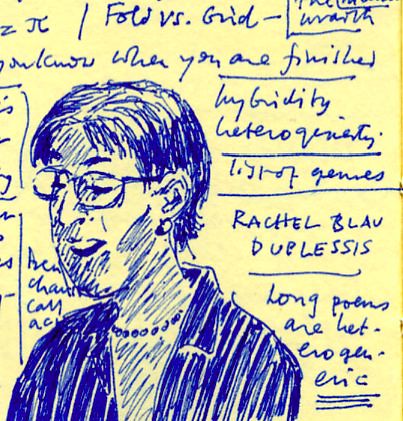 DuPlessis's lectures had me scribbling furiously--both notes and fragments towards other pieces--and one of the points her creative work (I'm thinking here of Drafts, which is like a felt-and-fat-and-dirt-and-muslin maze I like to linger in every so often) I am particularly fascinated by (there are many) is how she manages to make "marginality" an aspect of her work, to embody it in the work itself, various kinds of margins and edges and othernesses and folds and the interstices of folds, what issues in and around the shifting registers of the margins of (her) consciousness, drafting a flow that is thrilling and, as another critic has suggested, "anti-monumental."
DuPlessis's lectures had me scribbling furiously--both notes and fragments towards other pieces--and one of the points her creative work (I'm thinking here of Drafts, which is like a felt-and-fat-and-dirt-and-muslin maze I like to linger in every so often) I am particularly fascinated by (there are many) is how she manages to make "marginality" an aspect of her work, to embody it in the work itself, various kinds of margins and edges and othernesses and folds and the interstices of folds, what issues in and around the shifting registers of the margins of (her) consciousness, drafting a flow that is thrilling and, as another critic has suggested, "anti-monumental.""Poem be mine": after her reading of "Draft 56: Bildungsgedicht with Apple," I mentioned how much I admired it ("the mind is clamped with questions"), and she handed me the draft she was reading from to me, signed in red with a little note.
Here is a quote from it, the poem performing as it will(s):
"This poem is not you. Except as if you areand it concludes, after the dialogue between the apples:
yourself in doubt. The poem is doubt itself made evident.
Your trembling begins;
you guzzle at the twinkling beak of stars.
Marginality?
nothing I say can give the feel of it."
"Because in single language, the poemNothing you can say, while giving the feeling of it, freeing languages metamorphosing as you open it: "O poem, sweet, sweet poem be mine, be yearning nodules rich, or touching, or lucid, or economic, analytic, chrysophantic with hairy stars refracting under the surface of water...":
could not be complete, but since it craves
a multi-lingualism it barely earned,
let it fantasize, for then it flew unwrappt,
and rose enraptured, then it came to flow
amongst its several wilder tongues,
floating bolts of uncut cloth
that did not care for top or back
but draped and few and blew like clouds
and grew and plunged like waves."
"The long poem is heterogeneric."









I'm way behind in catching up on my blog reading (and writing), but I've always loved folks' scribbled notes, and appreciate the glimpse into your hand and style--a nice touch that provides some insight into the blogger.
ReplyDeleteGo O's!